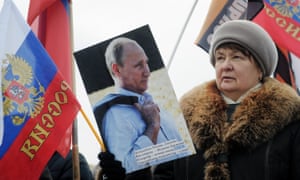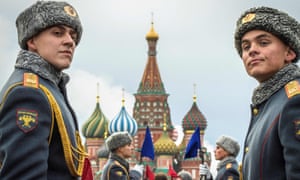
This account of how Putin’s new Russia rose from the ruins of the Soviet Union is judicious, humane and highly entertaining . Everyone’s talking about Russia again, troll farms, sanctions, money laundering, and all the rest of it. In a way, whatever the topic of the day, we’re just trying to answer one simple question, which is: WTF? There has been a wide acceptance among officials in both Europe and North America that we have collectively allowed our focus to slip since the end of the cold war. Our governments’ lack of interest has led us to misunderstand Russia’s development, misinterpret its economy, and misjudge its leaders. The results of these errors are all around us, most notably in the question of whether Putin was able to hijack the American ship of state, and hand the tiller to a popinjay.
Many people are to blame for this slipped focus, but one person who is not is Shaun Walker. As Moscow correspondent for the Guardian and Observer and, before that, the Independent, he has consistently been a thoughtful, sensitive, probing and resourceful chronicler. It is customary for Moscow correspondents to say how much they love Russia, but Walker writes as if he actually does, which gives his accounts of the misery suffered by much of the country still greater force.
Ukraine’s inexperienced volunteer battalions fought back, and before long there really were innocent civilians dying

A woman carrying a portrait of Vladimir Putin takes part in a pro-government anti-Maidan rally. Photograph: Alamy Stock
The Long Hangover is the fruit of more than a decade’s experience of living in Moscow, as well as journeys into some of the furthest reaches of the old Soviet empire. He travels to Kolyma, the old Gulag territory on the Pacific, to Chechnya and Kalmykia, where whole nations were deported by Stalin, and he visits the frontlines in eastern Ukraine, and the mess that is Crimea. His argument is rooted in the sense that the wounds inflicted by the Soviet experiment have never healed, at least partly because they’re too painful to treat.
“Russia was like a party host who awoke the morning after, started making a cursory effort to clean up the mess all around, but after a while simply gave up and slunk back to bed to nurse its hangover,” he writes, in one of the many salty metaphors that make the book great fun to read. That hangover is the long-lasting effect of the way the Soviet Union fell apart. People went to bed drunk in 1990 as citizens of a superpower, and woke up hungover in 1991 in one of 15 different squabbling republics. They had lost an empire, lost an economic system, and lost a political structure, all at once.

Russian soldiers rehearse for a re-enactment of the 1941 parade, when Red Army soldiers marched past the Kremlin to confront Nazi troops. Photograph: AFP/Getty Images
The last 23 years have been the story of the failure to overcome that “triple trauma”, Walker writes: witness how the opening ceremony of the Sochi Olympics did not even glancingly acknowledge the post-Soviet existence of the Russian Federation. At the heart of his book are multiple dichotomies – between memory and shame, money and principles, Ukraine and Russia – that appear impossible to resolve. “Almost everyone was at least partly a victim, almost everyone was at least partly a perpetrator.”
Instead of tending to these difficult cracks in society, Putin has sought to paper over them by elevating the Soviet Union’s victory in the second world war to the status of a national religion, effectively banning any criticism of it. His government has sought refuge from their failure to find a role in the modern world in a time when their country was truly heroic.
And this is a problem. As Anton Chekhov said: if you hang a rifle on a wall, it absolutely must go off. If you hang banners celebrating a military victory all over your country, then sooner or later a military victory absolutely must go off. This is where Walker finds the roots of Crimea’s annexation, the implausibly deniable invasion of eastern Ukraine, and all the tragedies that followed it. “Lies and propaganda had an unnerving tendency to become self-fulfilling prophecies. In Donbass, people took up arms against a phantom threat of fascist attack, but faced with losing yet more of the country, Ukraine’s weak army and inexperienced volunteer battalions fought back, and before long there really were innocent civilians dying.”
(It should be said, incidentally, that he is as detailed in his examination of Ukraine’s pathologies as he is of Russia’s; in fact, they act as mirror images of each other. If you’re looking for a book to tell you “Ukraine good, Russia bad”, then this is not the book for you.)
Walker’s argument cannot be summarised in a tweet, partly because he prefers asking questions to providing easy answers to them. The Long Hangover is considered and careful and humane, and should be compulsory reading for any politician considering engagement with either Moscow or Ukraine. It’s not only the best book I’ve read on Putin’s Russia, but also has great resonance for the age of Donald Trump and Brexit: no one likes being told they’re a loser, everyone needs something to believe in.
The Long Hangover is the fruit of more than a decade’s experience of living in Moscow, as well as journeys into some of the furthest reaches of the old Soviet empire. He travels to Kolyma, the old Gulag territory on the Pacific, to Chechnya and Kalmykia, where whole nations were deported by Stalin, and he visits the frontlines in eastern Ukraine, and the mess that is Crimea. His argument is rooted in the sense that the wounds inflicted by the Soviet experiment have never healed, at least partly because they’re too painful to treat.
“Russia was like a party host who awoke the morning after, started making a cursory effort to clean up the mess all around, but after a while simply gave up and slunk back to bed to nurse its hangover,” he writes, in one of the many salty metaphors that make the book great fun to read. That hangover is the long-lasting effect of the way the Soviet Union fell apart. People went to bed drunk in 1990 as citizens of a superpower, and woke up hungover in 1991 in one of 15 different squabbling republics. They had lost an empire, lost an economic system, and lost a political structure, all at once.

Russian soldiers rehearse for a re-enactment of the 1941 parade, when Red Army soldiers marched past the Kremlin to confront Nazi troops. Photograph: AFP/Getty Images
The last 23 years have been the story of the failure to overcome that “triple trauma”, Walker writes: witness how the opening ceremony of the Sochi Olympics did not even glancingly acknowledge the post-Soviet existence of the Russian Federation. At the heart of his book are multiple dichotomies – between memory and shame, money and principles, Ukraine and Russia – that appear impossible to resolve. “Almost everyone was at least partly a victim, almost everyone was at least partly a perpetrator.”
Instead of tending to these difficult cracks in society, Putin has sought to paper over them by elevating the Soviet Union’s victory in the second world war to the status of a national religion, effectively banning any criticism of it. His government has sought refuge from their failure to find a role in the modern world in a time when their country was truly heroic.
And this is a problem. As Anton Chekhov said: if you hang a rifle on a wall, it absolutely must go off. If you hang banners celebrating a military victory all over your country, then sooner or later a military victory absolutely must go off. This is where Walker finds the roots of Crimea’s annexation, the implausibly deniable invasion of eastern Ukraine, and all the tragedies that followed it. “Lies and propaganda had an unnerving tendency to become self-fulfilling prophecies. In Donbass, people took up arms against a phantom threat of fascist attack, but faced with losing yet more of the country, Ukraine’s weak army and inexperienced volunteer battalions fought back, and before long there really were innocent civilians dying.”
(It should be said, incidentally, that he is as detailed in his examination of Ukraine’s pathologies as he is of Russia’s; in fact, they act as mirror images of each other. If you’re looking for a book to tell you “Ukraine good, Russia bad”, then this is not the book for you.)
Walker’s argument cannot be summarised in a tweet, partly because he prefers asking questions to providing easy answers to them. The Long Hangover is considered and careful and humane, and should be compulsory reading for any politician considering engagement with either Moscow or Ukraine. It’s not only the best book I’ve read on Putin’s Russia, but also has great resonance for the age of Donald Trump and Brexit: no one likes being told they’re a loser, everyone needs something to believe in.
No comments:
Post a Comment